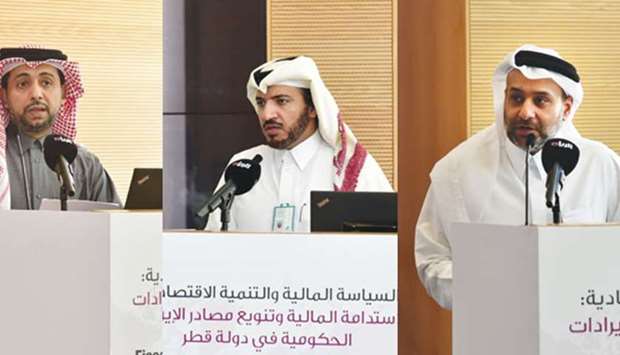Leading international economists, tax experts and professionals took part in the first annual conference organised by the Centre for Entrepreneurship (CFE) at Qatar University’s College of Business and Economics (QU-CBE).
The two-day event, which opened yesterday in collaboration with Qatar Financial Centre (QFC) Authority, is on “Fiscal Policy and Economic Development - Fiscal Sustainability and Diversifying of Government Revenues.” It aims to discuss the importance of diversifying government revenues, the appropriate design of value-added tax (VAT) law and the current situation of tax compliance in Qatar.
The event also aims to identify the importance of restructuring the tax system in Qatar to assess the current situation of tax administration and the challenges to manage VAT.
Organisers want to raise community awareness about new government policies, as well as to encourage research in the area of fiscal policy.
QU president Dr Hassan al-Derham, QFC Authority CEO Yousuf Mohamed al-Jaida, CBE dean Dr Khalid Shams M A al-Abdulqader, and CFE director Dr Mahmoud Abdellatif, as well as CBE faculty, staff and students attended the conference.
Keynote speakers include Mario Mansour (International Monetary Fund), Professor Rick Krever (University of Western Australia), Michael Evans (University of Melbourne), Professor Jeyapalan Kasipillai (Monash University), and Professor Binh Tran-nam (University of New South Wales).
The speakers discussed issues on how to diversify government revenues and the need for tax reform, drafting challenges of VAT law, “how does tax administration successfully manage VAT,” and how to improve tax
compliance.
The event featured four panel discussions titled ‘Tax policy and tax reform in developing countries and Qatar’; ‘Determinants for drafting VAT law in Qatar’; ‘Tax administration in GCC countries and the challenges to manage VAT’; and ‘How to develop a tax compliance culture in Qatar.’ It also included a roundtable discussion on VAT and banking transactions.
In his remarks, Dr al-Derham said QU is committed to fulfil the goals of Qatar National Vision 2030 and pointed out that it is reflected through the new
strategy (2018-2022).
Al-Jaida highlighted the importance of pushing forward to diversify Qatar’s economy, continue expanding economic and trade relations and look for new ways to source revenue for the economy.
“Reforms such as VAT will help generate revenue and move us away from being an oil
dependent economy,” he said.
“QFC continues to attract FDI and providing a competitive platform for businesses to expand to Qatar. We will continue to support the development and diversification of Qatar’s economy, broadening our platform to cater to the needs of the country, and reaffirm our economic attractiveness as a nation,”
al-Jaida said.
Dr al-Abdulqader said the fluctuations in oil and gas prices and global financial markets require the establishment and implementation of a financial policy covering government costs and revenues.
“This also includes the diversification of government revenues in order to maintain the level of costs and ensure the provision of public services to the current and future generations,” he added
“We look forward to submitting the recommendations that will emanate from this event’s discussions to the Ministry of Finance and using them to generate policies to build the country’s economy,” Dr al-Abdulqader stressed.

